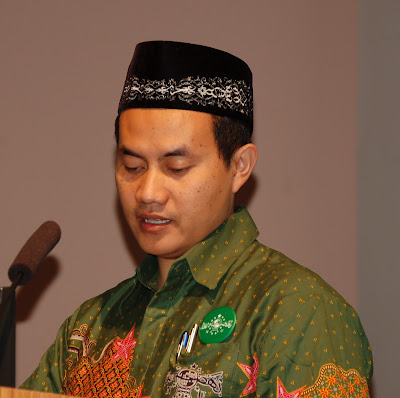27-29 March 2017 the Special Branch of Nahdlatul Ulama in the Netherlands organised a three-day programme (Festival) on the concept of Islam Nusantara. The first day was a full conference programme. The ambitious programme to make it the beginning of a series of biannial meetings.
The International Conference Rethinking Indonesia's Islam Nusantara: From Local Relevance to Global Significance had a slow start with many short speeches by functionaries: dean of the theological faculty of VU, ambassador in The Hague I Gusti Agung Wesaka Puja, two NU leadersthe young Fachrizal Affandi for the Tanfidziyah ansd the somewhat older, but looking more pastoral KH Zulfa Mustofa.
Zulfa Mustofa was the only yo give a speech in Arabic, clear extremely well written, defending that local adaptations are a general feature of the international religion of Islam. It was either polemic nor defensive, as if the theme of Islam Nusantara is accepted by a vast majority in the organization and in Indonesian Islam in general (what is not the case!).
The only lady speakere here was Safira Machrusah, a 'NU activist', so not someone in a hierarchical position. Traditionally in dress, but a very good speaker.
Machrusah has been for her Ph.D. in Australia and feels comfortable in an internaionally audience. But the major speaker in the morning session was Ahmad Baso, also not someone in a high hierarchical position within NU, although I heard that he has a position in Lakpesdam, the office for education and human resources development of the great organizatrion. He has finshed no formal education at academic level, but is a good writer and avid reader. He gives spirited speeches and is by some seen as the great power behind the idea of Islam Nusantara, which was launched at the Muktamar of Djombang in 2015.
He has a style of talking of a great religious leader: starting with a quite calm warming and than moving the a full-fledged dramatic style asfter some ten minutes to calm again aftar ten minutes in a concluding way. He has published nearly twenty books, mostly on the history of pesantren, but also on the contribution of Nahdlatul Ulama to the political unity of Indonesia. His small book The Intellectual Origins of Islam Nusantara. A Study of a Globalising Islam and Reform of Hegemonic Reason (Jakarta, March 2017) is more or less written as an ideological pamphlet in preparation for this three-day event. He hopes that Indonesian Islam will be recognized internationally as an interesting, important blend of Islam, besides the Arabic Islam of Wahhabi or Salafi origins which is now dominating the international press and other media. It was repeated again and again that this support of 'moderate' Islam was an action against Arab Islam, but the other side of the coin is the fervent nationalist pride which can be heard in his speech and read in his book: from the earliest Muslim in the archipelago (in the 12th century CE, Muslim traders or 'Sindbad Muslim' in the language of Fatema Mernissi, who settled in Pasai or Samudra/Semutra, now the eastern coast of Aceh).
The afternoon was for sessions of younger participants, many of them Ba, MA or PhD Students. There was a quite technical talk about santrionline, a quite popular website. Also a talk about Mafia Sholawat by K.H. Ali Shodiqin, a series that also can be seen in many Youtube movies: looks more Arabic than Indonesia, whith derwish dancing in the Rumi/Turkish style, but the young preacher wears a black turban and black jellaba. There were still 30 more presentations, divided in four groups. About the Mafia Sholawat I will receive the paper by the researcher and maybe write later about it.
The most important qualification of Islam Nusantara is still that it is moderate, tolerant, liberal. These are qualifications to be given by administrators, bureaucrats. The more striking are that it is nationalist, based on love for the own country and its excellence and that it is modern.




Geen opmerkingen:
Een reactie posten